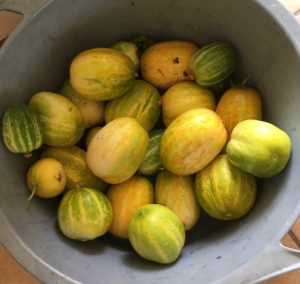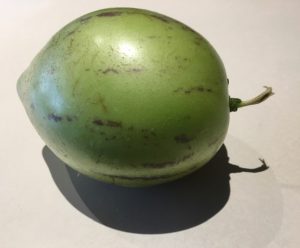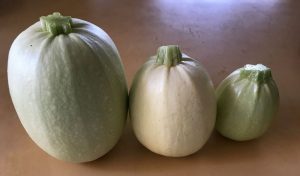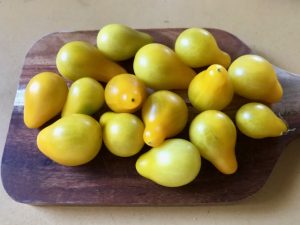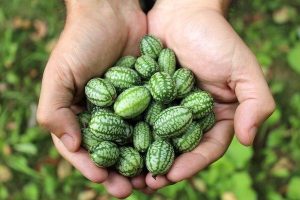Thanks to all the people who have contributed to this week’s newsletter: Ann Stanley, Cathy Romeo, Dave Chambers, Doris Glier, Keryn Johnson, Lee Hirsh, Megan Goodman, Nancy Mills, Pam Jenkins, Rita Varrasso, Soo Mei Leong, Stuart Rodda and Vasundhara Kandpal.
What farmers’ markets will be happening this weekend?
On Saturday: Coburg. Not Carlton.
On Sunday: Alphington and Eltham. Not Yarra Valley.
Vasundhara’s recipes of the month – main courses
The theme for Vasundhara Kandpal’s three recipes this month is main courses. The three recipes are:
Like all of Vasundhara’s recipes, the recipes are plant-based.
As I’ve got space, I’m going to provide my favourite of the three recipes (the spicy baked cauliflower) in full below but you will have to go to the website to read the other two.
Spicy baked cauliflower
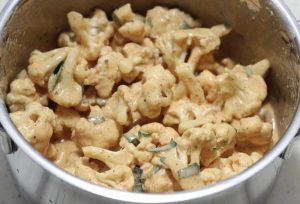 |
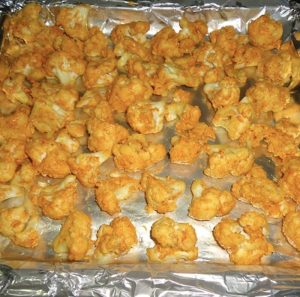 |
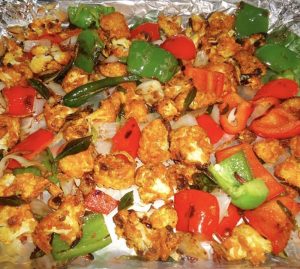 |
| Marinated | On the baking tray | The final product |
2 tablespoons red onion
¾ cup + 2 tablespoons unbleached plain flour
3 tablespoons corn starch
1 teaspoon salt
1 teaspoon garam masala
1½ teaspoons cayenne powder
1 teaspoon sriracha/chili garlic/hot sauce
1 inch ginger
4 cloves garlic
2 teaspoons soy sauce
1 cup water
2 teaspoons oil
4-5 cups cauliflower florets
Pre heat oven to 215degC.
Blend all the ingredients except the cauliflower in a blender to form a smooth paste. If the batter is too thin, add 1-2 tablespoons flour, as required.
Add the cauliflower florets in the batter and let then marinate for 15 minutes.
Line the florets on a baking tray and spray or brush with oil.
Bake for 30-35 minutes while rotating it midway through.
You can add some capsicum and onions halfway through the cooking for extra crunch and flavours.
Serve hot!
Read more of Vasundhara’s recipes on our website.
Vasundhara Kandpal is a professional cook who operates a meals delivery service called Green Karma in Briar Hill, Eltham, Eltham North and Montmorency. Read her menu and order.
Food is free in Diamond Creek
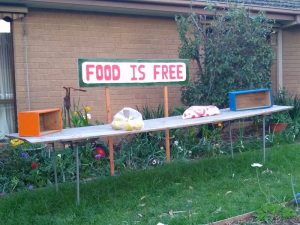 A few months ago, we announced that The Rotary Club of Diamond Creek has partnered with SecondBite to give away free food on most Saturdays, from 9-10am, at Diamond Creek Church, 32 Wensley Street, Diamond Creek (opposite Aksorn Thai and the police station). They make announcements about the upcoming sessions on this Facebook page.
A few months ago, we announced that The Rotary Club of Diamond Creek has partnered with SecondBite to give away free food on most Saturdays, from 9-10am, at Diamond Creek Church, 32 Wensley Street, Diamond Creek (opposite Aksorn Thai and the police station). They make announcements about the upcoming sessions on this Facebook page.
We are now announcing that there is also a ‘food is free’ table at the church (in the garden in front of the manse) where “local residents have begun using this as a space to share what they are ‘making and doing during [coronavirus] lockdown.” See picture right. Thanks for the heads up, Pam Jenkins!
Interested in wine making?
Following last week’s brief article, Dave Chambers has written in: “Did you know that the The Eltham and District Winemakers Guild is one of the largest amateur wine making guilds in Australia and runs an annual Amateur Wine Show (in November) that is the largest in the Southern Hemisphere? We are currently seeking new members. Membership is $45pa and includes monthly guild nights where members are entertained with guest speakers, where members wine making techniques are discussed; social visits to wineries and wine tasting masterclasses are all offered. If potentially interested in joining, email us (info@amateurwine.org.au) and we’ll get back to you.”
No, you didn’t know
Last week, Jo Buckle asked what was causing the dry rot at the base is her apricot tree. No one answered. Email me with your answers.
Newsletter readers’ food growing tips
Growing tomatoes from saved seed
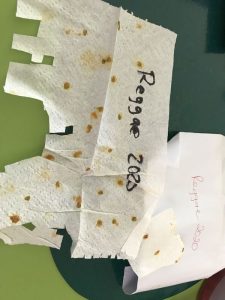 Stuart Rodda has been reflecting on how he grows tomatoes from saved seed and has written the following 10-point plan. In essence, he saves seed by drying the pulp on labelled kitchen paper and then, in Spring, germinates them while still on the paper. He doesn’t think that there is any need to wash or otherwise process the seeds. The method of seed saving described in the first 5 steps should take only a few minutes of your time per tomato variety and makes them easy to plant. Remember to read this 10-point plan again in late Summer, when you are ready to seed-save your tomatoes again!
Stuart Rodda has been reflecting on how he grows tomatoes from saved seed and has written the following 10-point plan. In essence, he saves seed by drying the pulp on labelled kitchen paper and then, in Spring, germinates them while still on the paper. He doesn’t think that there is any need to wash or otherwise process the seeds. The method of seed saving described in the first 5 steps should take only a few minutes of your time per tomato variety and makes them easy to plant. Remember to read this 10-point plan again in late Summer, when you are ready to seed-save your tomatoes again!
- In March or April, select a good quality ripe fruit (or more than one) of a variety which worked well for you.
- Take a piece of kitchen paper and, with a felt pen, label it with the variety and year.
- Squeeze some pulp onto the paper and spread the seed out with your fingers or a knife so they are separate from each other.
- Set the paper aside to dry indoors without direct heat in a convenient spot for a week or more.
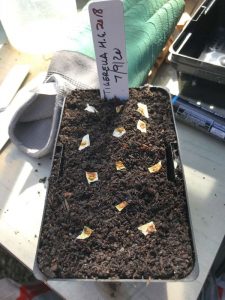 Place the dry paper in a labelled paper envelope and store in a jar in a cupboard until the next seed starting season (i.e. August or September).
Place the dry paper in a labelled paper envelope and store in a jar in a cupboard until the next seed starting season (i.e. August or September).- In late Winter, using small scissors, cut out the number of individual seeds that you need (still dry and stuck to the paper) and put them in your favourite seed raising mix (punnets, tubes, pots, etc). Because the seed is stuck to a small piece of paper, it is easy to see and handle. Put the unused seed back in the envelope for use next time. If your seed-raising mix has no nutrients then, once the seeds germinate and get to the two-leaf stage, it will be necessary to start watering them with a dilute fertiliser such as Seasol/Powerfeed (one capful in 9 litres of water).
- Keep the punnets in a warm moist spot until the seeds germinate (3-5 days) and then make sure that they get plenty of light as the plants grow.
- Either pot them up into larger containers in the same potting mix or wait until they are 10cm or so in height before planting in the garden. It is best to ‘harden them off’ outdoors for a couple of days before transplanting.
- For garden stakes, I use old galvanised water pipe. They have lasted over 20 years, still going strong, and were free to begin with. There is no need to buy hardwood stakes every couple of years.
- To tie up the plants, I use torn up strips of old pure cotton bed sheets (not synthetic such as cotton/polyester). They are ‘free’ or very cheap from op shops, are kind to the plant stems, and can be composted with the dead plants at the end of the season. One sheet can give you hundreds of plant ties.
Disposable coffee cups
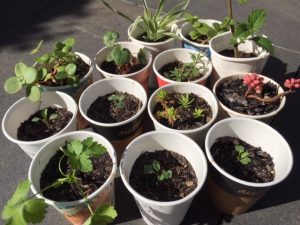 Following on Lyn Richards’ tip last week to use yoghurt pots to grow seedlings, Nancy Mills has written in: “Right now, with many cafes refusing re-usable coffee cups during the pandemic lockdown, here’s a tip for coffee-loving Melburnians. The takeaway coffee cups that you find in just about every cafe make great little pots for growing cuttings and seeds. Remember to poke holes in the bottom first with a screwdriver or scissors to ensure adequate drainage. I mostly use the disposable cups for plants that I’m growing to give away, as they slowly deteriorate.”
Following on Lyn Richards’ tip last week to use yoghurt pots to grow seedlings, Nancy Mills has written in: “Right now, with many cafes refusing re-usable coffee cups during the pandemic lockdown, here’s a tip for coffee-loving Melburnians. The takeaway coffee cups that you find in just about every cafe make great little pots for growing cuttings and seeds. Remember to poke holes in the bottom first with a screwdriver or scissors to ensure adequate drainage. I mostly use the disposable cups for plants that I’m growing to give away, as they slowly deteriorate.”
Read more newsletter reader tips.
Anyone else got any growing tips that they are willing to share? Email me.
Do you know? ?
Nancy follows on her tip with a ‘do you know’ question (which only applies in her case when the takeaway coffee cups have been re-used a few times and have started to deteriorate): “How to you dispose of takeaway coffee cups? I’ve tried putting biodegradable takeaway cups in a compost bin. Over time, the cups start to break down, but they don’t fully degrade in the time that it takes to compost other compostable materials. And the ‘biodegradable’ lids don’t seem to change at all. Has anyone succeeded in fully composting the cups or the lids?” Email me with your answers.
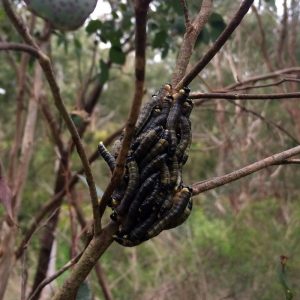 Doris Glier asks: “These larvae were on a gum tree [see picture right]. Does anyone know what they are?” Email me with your answers.
Doris Glier asks: “These larvae were on a gum tree [see picture right]. Does anyone know what they are?” Email me with your answers.
A suggestion for your children or school
Lee Hirsh has written in to suggest that you gardeners might which to grow their seedlings in patterns which spell out their names [Editor: easier to do if you are called ‘Lee’ than if you are called ‘Vasundhara’!]. So, as the seedlings grow, so does their name. Or maybe spell out ‘welcome’ in the front garden. Or even the name of the school.
Another article by Angelo Eliades
The fastest way to transplant volunteer seedlings with minimum root disturbance.
Read more Angelo’s food-related articles.
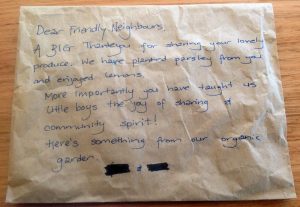 What a nice note!
What a nice note!
One of our newsletter readers recently received the note pictured right.
Meg’s social isolation week
I cannot use our lemons fast enough and the heavily laden Eureka’s branches are bent under their weight. This weekend I have made even more lemon curd and a lemon teacake. So, I’m now leaving a basket out the front with our citrus on offer to any passers-by. As the light fades, I wander out to collect the basket and am pleased to see that the lemons are gone.
This reminds me of the value of the food swaps that would normally be laden with citrus fruit this time of year. My notes dated 9th September last year say: “Potatoes now up. Harvested some silverbeet, spinach, broccoli and lettuce. Took more lemons, limes and mandarins to swap-tables laden. Came home with oranges (a different citrus!) and a small jar of honey.”
Basic lemon teacake
125g butter, softened
125g caster sugar (plus a little extra to serve)
1 cup self-raising flour
2 eggs
rind of 1 lemon, finely grated
Cream the butter and sugar.
Add the eggs one at a time and beat well.
Add the rind and flour. You can add a little lemon juice if needed to bring the cake batter together.
Bake at 180degC for 35-40 minutes.
Sprinkle with a little sugar to serve.
Reader photos
Last week’s theme – interesting summer crops
5 photos were submitted – not many, but all interesting.
Prompted by my picture last week, Shellie Drysdale asked where she could buy ‘popcorn’ seeds. Green Harvest are currently selling them online, as are Eden Seeds. Bulleen Art & Garden nursery currently have blue popcorn seeds.
This week’s theme – interesting Spring flowers
The photo theme this week is ‘interesting Spring flowers’. As ever, send me your interesting photos, together with a title and (if you want) a story, and I will publish them next week. Please submit any photos by end of play on Sunday at the latest.
To get you started, here is a picture of my currently flowering Salvia africana-lutea (golden sage), with its unusual brown flowers.
Which link was clicked most times in the last newsletter?
Pam’s video and words on alternative Winter greens.
Joke of the week
What does a cabbage outlaw have? A price on his head.
Upcoming online events
If you know of any events other than those listed below, email me.
Newly announced events
Spring in the garden – what to do now: Thursday, 17th September, 10-11am; free; organised by Iramoo Community Centre. Recommended by Keryn Johnson. Book your place by emailing them.
Beeswax wraps: Friday, 18th September, 4-5pm; free; organised by Yarra Plenty Library.
Garden bed basics: Sunday, 20th September, 11am-2pm; $donation; organised by Brunswick Tool Library. Read more and book on EventBrite.
Prepping for summer veggies: Thursday, 24th September, 10-11am; free; organised by Iramoo Community Centre. Recommended by Keryn Johnson. Book your place by emailing them.
Garden bed basics: Sunday, 11th October, 11am-1pm; $donation; organised by Brunswick Tool Library. Read more and book on EventBrite.
Backyard beekeeping basics: Wednesday, 14th October, 7-9pm; $50; organised by CERES. Read more and book on Humanitix.
Growing fruit and veg in a wildlife garden: Thursday, 29th October, 7-8.30pm; free; organised by Sustainable Gardening Australia. Read more and book on WeTeachMe.
Previously announced events
Growing food in the workplace: Wednesday, 16th September, 3-4pm; free; organised by Darebin Council. Read more and book on EventBrite.
Pandemic gardening – a wish for tomorrow: Wednesday, 16th September, 7.15-9.15pm; $17; organised by Sustain. Read more and book on Humanitix.
The climate emergency & Nillumbik Shire – what’s the story: Saturday, 19th September, 2-3.30pm; free; organised by Nillumbik Climate Emergency Action Team.
Lamb vindaloo: Saturday, 19th September, 5-6.30pm; $35; organised by Cook Indian by the Creek. Read more and book via Facebook.
Chooks 4 families & kids: Saturday, 26th September, 10-11.30am; $10; organised by Edendale. Read more and book on WeTeachMe.
Growing microgreens: Saturday, 26th September, 11am-midday; $25; organised by Sustainable Gardening Australia. Read more and book on WeTeachMe.
Flatbread parantha and raita: Saturday, 26th September, 5-6.30pm; $29; organised by Cook Indian by the Creek. Read more and book via Facebook.
Biodiversity and sustainable food systems: Wednesday, 30th September, 10.30am-2.30pm; $120; organised by CERES. Read more and book on Humanitix.
Wonderful world of worms for kids: Thursday, 1st October, 3-4pm; free; organised by Edendale. Read more and book on WeTeachMe.
Cooking up compost: Saturday, 3rd October, 2-3.30pm; free; organised by Zero Waste Victoria. Read more and book on Humanitix.
Onion and potato bhaji and chutney: Saturday, 3rd October, 4-5.30pm; $29; organised by Cook Indian by the Creek. Read more and book via Facebook.
Queensland fruit fly for home gardeners: Monday, 5th October, 7-8.30pm; free; organised by Edendale. Read more and book on WeTeachMe.
Backyard chooks for beginners: Saturday, 10th October, 10-11.30am; $10; organised by Edendale. Read more and book on WeTeachMe.
Lamb bhuna masala: Saturday, 10th October, 5-6.30pm; $35; organised by Cook Indian by the Creek. Read more and book via Facebook.
Chicken biryani: Friday, 16th October, 5-6.30pm; $35; organised by Cook Indian by the Creek. Read more and book via Facebook.
Open Table offer their weekly no waste cook club workshops free and online on Saturdays. As well as cooking (which is actually optional), you will learn about food waste and composting. Register on EventBrite.
All The Dirt is a weekly podcast about gardening.

